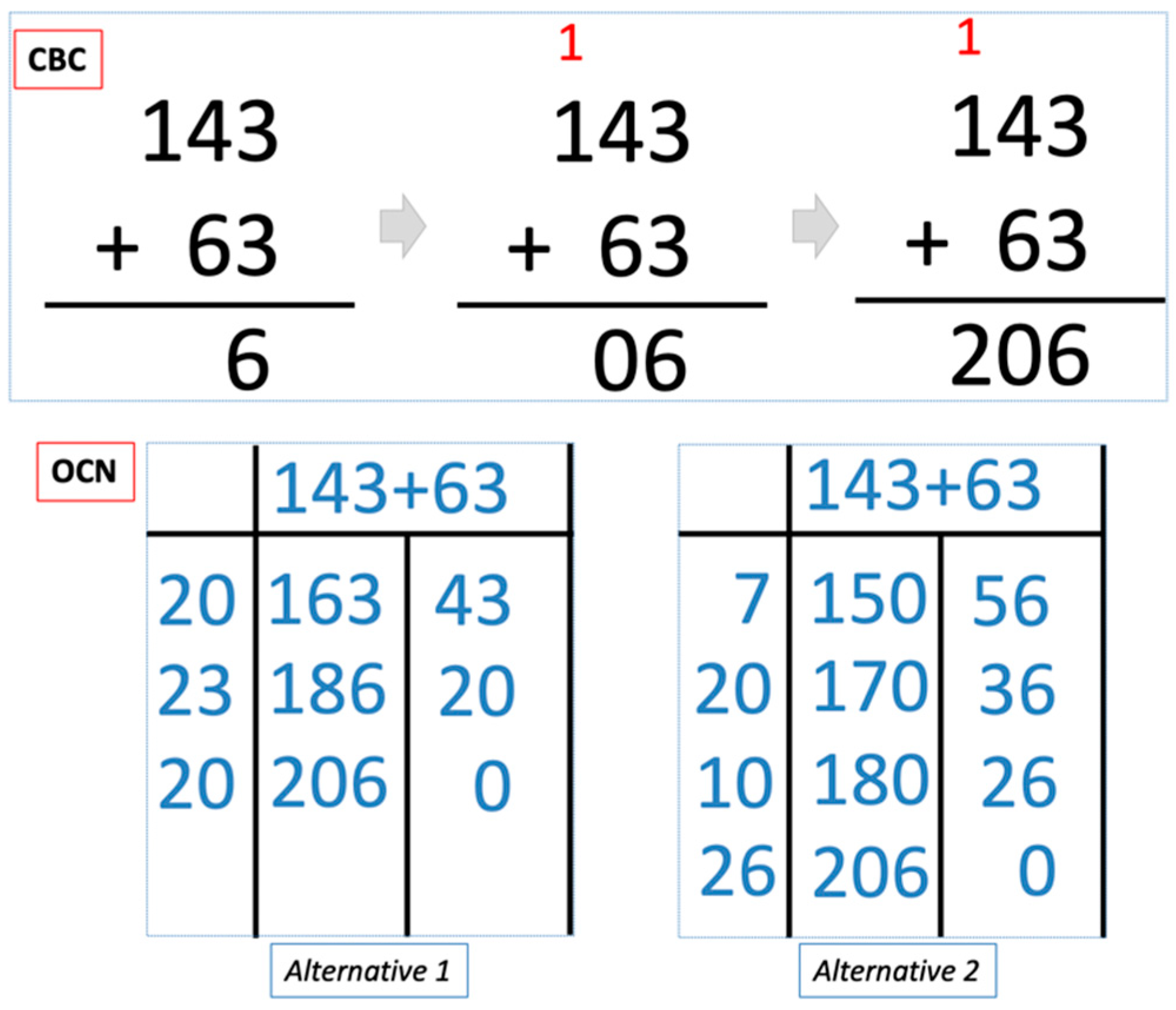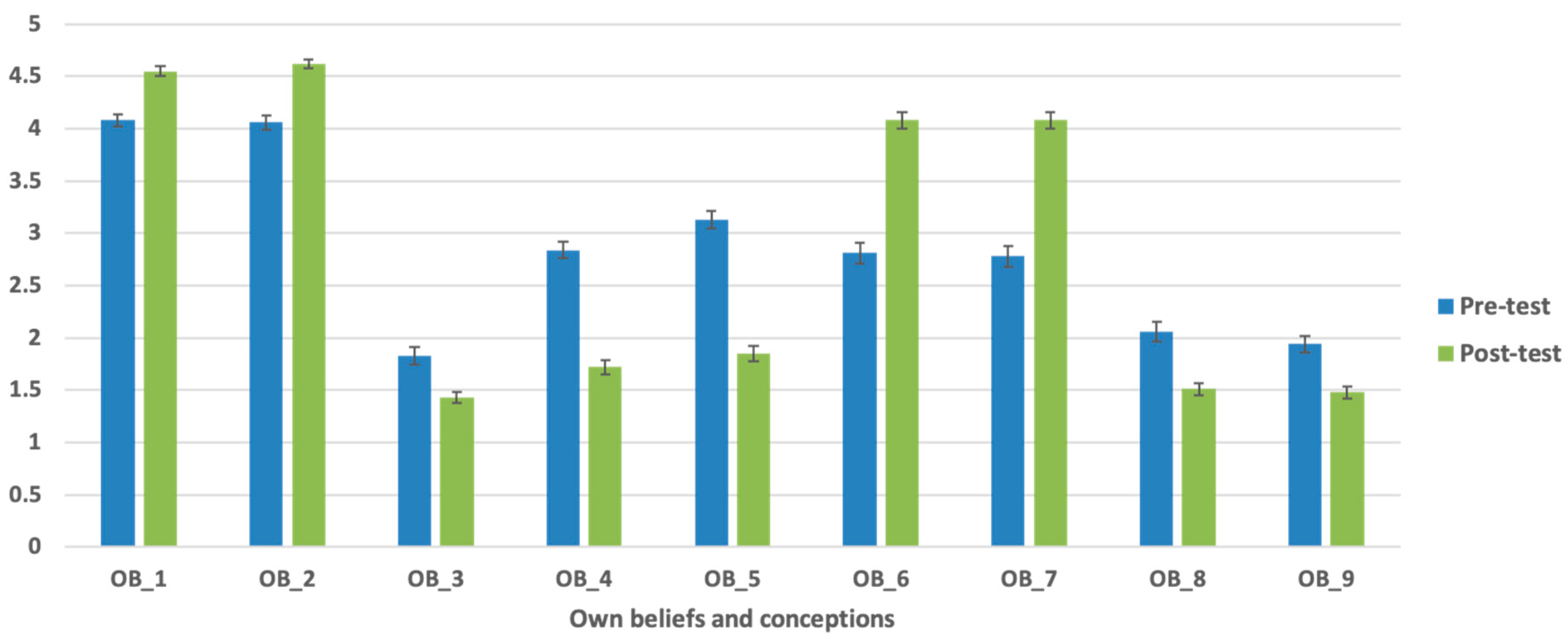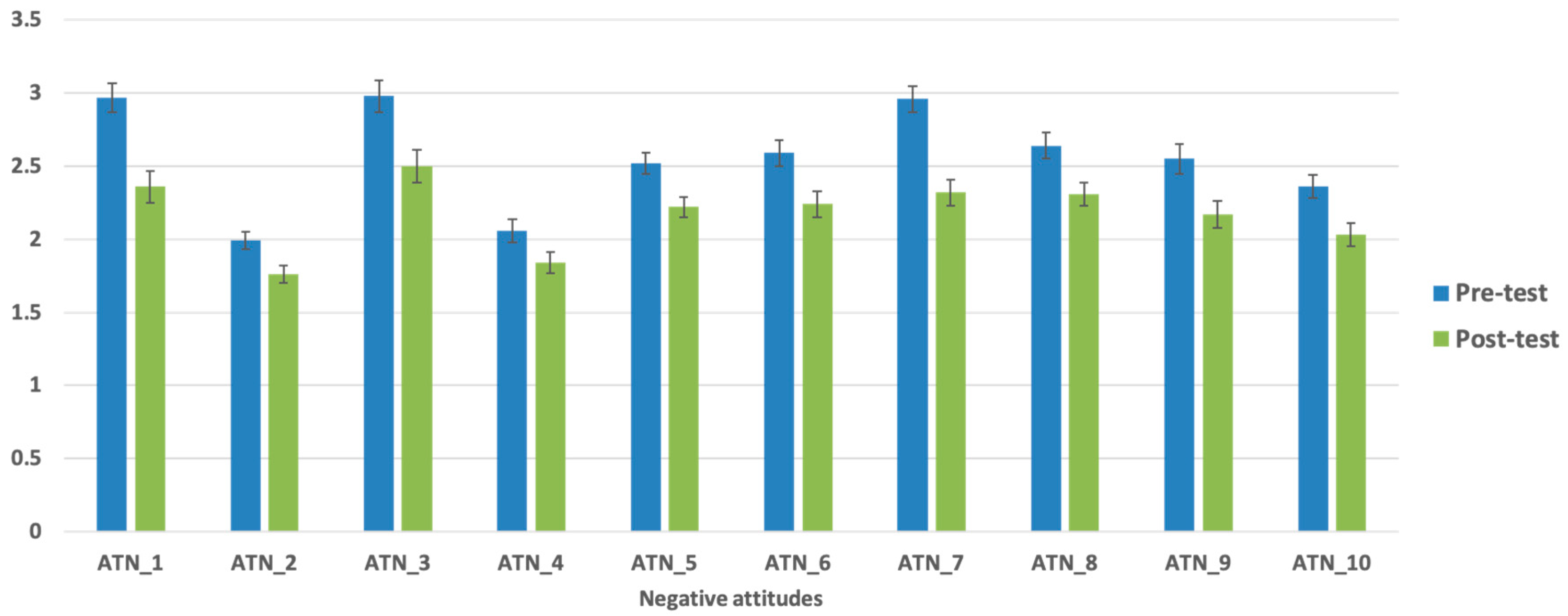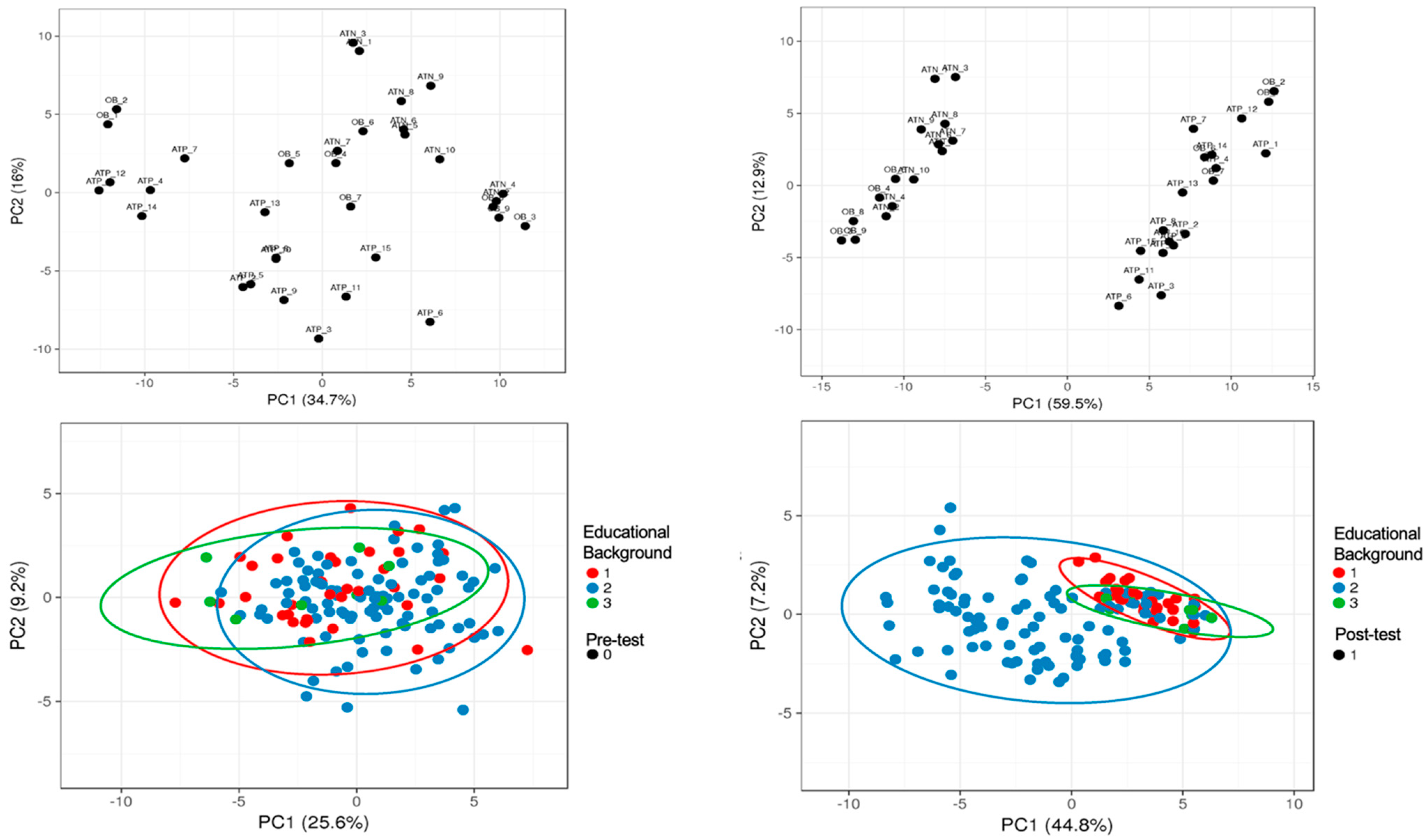Flipped-OCN Method in Mathematics Learning to Analyze the Attitudes of Pre-Service Teachers
Abstract
1. Introduction
2. Materials and Methods
2.1. Sample
2.2. Course Context
2.3. Research Instrument and Procedure to Assess the PSTs Attitudes toward Mathematics Learning
2.4. Collected Data Analysis
3. Results and Discussion
4. Conclusions
Author Contributions
Funding
Institutional Review Board Statement
Informed Consent Statement
Data Availability Statement
Conflicts of Interest
References
- Butterworth, B.; Varma, S.; Laurillard, D. Dyscalculia: From brain to education. Science 2011, 332, 1049–1053. [Google Scholar] [CrossRef]
- Hill, H.C.; Blunk, M.; Charalambous, C.; Lewis, J.; Phelps, G.; Sleep, L.; Ball, D.L. Mathematical knowledge for teaching and the mathematical quality of instruction: An exploratory study. Cogn. Instr. 2008, 26, 430–511. [Google Scholar] [CrossRef]
- Martínez-Montero, J.; Sánchez, C. Resolución de Problemas Y Método ABN; Wolters Kluwer Educación: Alphen aan den Rijn, The Netherlands, 2013. [Google Scholar]
- Jeong, J.S.; González-Gómez, D. Adapting to PSTs’ pedagogical changes in sustainable mathematics education through flipped e-learning: Ranking its criteria with MCDA/F-DEMATEL. Mathematics 2020, 8, 858. [Google Scholar] [CrossRef]
- Thames, M.H.; Ball, D.L. What mathematical knowledge does teaching require? Knowing mathematics in and for teaching. Teach. Child. Math. 2010, 17, 220–225. [Google Scholar] [CrossRef]
- Fuchs, L.S.; Fuchs, D.; Powell, S.R.; Seethaler, P.M.; Cirino, P.T.; Fletcher, J.M. Intensive intervention for students with mathematics disabilities: Seven principles of effective practice. Learn. Disabil. Q. 2008, 31, 79–92. [Google Scholar] [CrossRef] [PubMed]
- Fletcher, J.M.; Lyon, G.R.; Fuchs, L.S.; Barnes, M.A. Learning Disabilities: From Identification to Intervention; Guilford Press: New York, NY, USA, 2007. [Google Scholar]
- Aunio, P.; Heiskari, P.; Van Luit, J.E.; Vuorio, J. The development of early numeracy skills in kindergarten in low, average and high performance groups. J. Early Child. Res. 2015, 13, 3–16. [Google Scholar] [CrossRef]
- European Commission. Science Education for Responsible Citizenship. 2015. Available online: http://goo.gl/Vm3pZ0 (accessed on 14 November 2020).
- Maaß, K.; Artigue, M. Implementation of inquiry-based learning in day-to-day teaching: A synthesis. ZDM 2013, 45, 779–795. [Google Scholar] [CrossRef]
- OECD Library. Global Teaching Insights. 2021. Available online: https://www.oecd-ilibrary.org/education/global-teaching-insights_20d6f36b-en (accessed on 23 October 2020).
- Hughes, C.; Acedo, C. Guiding Principles for Learning in the Twenty-First CENTURY; International Bureau of Education UNESCO: Geneva, Switzerland, 2014; Volume 28. [Google Scholar]
- Ernest, P. Popularization: Myths, massmedia and modernism. In International Handbook of Mathematics Education; Bishop, A.J., Clements, K., Keitel, C., Kilpatrick, J., Laborde, C., Eds.; Springer: Amsterdam, The Netherlands, 1997; pp. 877–908. [Google Scholar]
- Contreras, J. Where is the treasure? Ask interactive geometry software! J. Math. Educ. Teach. Coll. 2014, 5, 35–40. [Google Scholar]
- Bruner, J.S. The Process of Education; Harvard University Press: Boston, MA, USA, 1977; Volume 115. [Google Scholar]
- Noss, R.; Hoyles, C. Windows on Mathematical Meanings: Learning Cultures and Computers; Kluwer Academic Publishers: Dordrecht, The Netherlands, 1996. [Google Scholar]
- Schoenfeld, A. The math wars. Educational Policy: An Interdisciplinary. J. Policy Pract. 2004, 18, 253–286. [Google Scholar]
- Hoyles, C. Engaging with mathematics in the digital age. In Cuadernos de Investigacion y Formacion en Educacion Matematica 15: Trabajos de la XIV CIAEM; Universidad di Costa Rica: San José, Costa Rica, 2016; pp. 225–236. [Google Scholar]
- Martínez-Montero, J. El método de cálculo abierto basado en números (ABN) como alternativa de futuro respecto a los métodos tradicionales cerrados basados en cifras (CBC). Bordón. Rev. Pedagog. 2011, 63, 95–110. [Google Scholar]
- Kamii, C.; Dominick, A. To teach or not to teach algorithms. J. Math. Behav. 1997, 16, 51–61. [Google Scholar] [CrossRef]
- Ablewhite, R.C. Las Matemáticas Y Los Menos Dotados; Ediciones Morata: Madrid, Spain, 1971. [Google Scholar]
- Bull, R.; Lee, K. Executive functioning and mathematics achievement. Child. Dev. Perspect. 2014, 8, 36–41. [Google Scholar] [CrossRef]
- González-Gómez, G.; Jeong, J.S.; Airado, D.; Cañada-Cañada, F. Performance and perception in the flipped learning model: An initial approach to evaluate the effectiveness of a new teaching methodology in a general science classroom. J. Sci. Educ. Technol. 2016, 25, 450–459. [Google Scholar] [CrossRef]
- Bergmann, J.; Sams, A. Flipped Learning: Maximizing Face Time. White Paper. 2014. Available online: https://www.td.org/magazines/td-magazine/flipped-learning-maximizing-face-time (accessed on 21 September 2020).
- Li, N.; Chee Mok, I.A.; Cao, Y. The evolution of mathematical thinking in Chinese mathematics education. Mathematics 2019, 7, 297. [Google Scholar] [CrossRef]
- Garofalo, J. Beliefs and their influence on mathematical performance. Math. Teach. 1989, 82, 502–505. [Google Scholar] [CrossRef]
- Van den Heuvel-Panhuizen, M. Children Learn Mathematics. A Learning-Teaching Trajectory with Intermediate Attainment Targets for Calculation with Whole Numbers in Primary School; Freudenthal Institute: Utrecht, The Netherlands, 2001. [Google Scholar]
- Lipnevich, A.A.; MacCann, C.; Krumm, S.; Burrus, J.; Roberts, R.D. Mathematics attitudes and mathematics outcomes of US and Belarusian middle school students. J. Educ. Psychol. 2011, 103, 105–118. [Google Scholar] [CrossRef]
- Burrus, J.; Moore, R. The incremental validity of beliefs and attitudes for predicting mathematics achievement. Learn. Individ. Differ. 2016, 50, 246–251. [Google Scholar] [CrossRef]
- Ma, X.; Kishor, N. Assessing the relationship between attitude toward mathematics and achievement in mathematics: A meta-analysis. J. Res. Math. Educ. 1997, 28, 26–47. [Google Scholar] [CrossRef]
- Fishbein, M.A.; Ajzen, I. Belief, Attitude, Intention and Behaviour: An Introduction to Theory and Research; Addison-Wesley: Reading, MA, USA, 1975. [Google Scholar]
- Jeong, J.S.; González-Gómez, D.; Conde-Núñez, M.C.; Gallego-Picó, A. Examination of students’ engagement with R-SPQ-2F of learning approach in flipped sustainable science course. J. Baltic Sci. Educ. 2019, 18, 880–891. [Google Scholar] [CrossRef]
- González-Gómez, D.; Jeong, J.S.; Cañada-Cañada, F. Enhancing science self-efficacy and attitudes of Pre-Service Teachers (PST) through a flipped classroom learning environment. Interact. Learn. Environ. 2019, 1–12. [Google Scholar] [CrossRef]
- Petty, R.; Cacioppo, J. Attitudes and Persuasion: Classic and Contemporary Approaches; Springer: Dubuque, IA, USA, 1981. [Google Scholar]
- Avery, L.M.; Meyer, D.Z. Teaching science as science is practice: Opportunities and limits for enhancing preservice elementary teachers’ self-efficacy for science and science teaching. Sch. Sci. Math. 2012, 112, 395–409. [Google Scholar] [CrossRef]
- Sams, A.; Bergmann, J. Flip your students’ learning. Technol. Rich. Learn. 2014, 70, 16–20. [Google Scholar]
- Oppermann, E.; Brunner, M.; Anders, Y. The interplay between preschool teachers’ science self-efficacy beliefs, their teaching practices, and girls’ and boys’ early science motivation. Learn. Individ. Differ. 2019, 70, 86–99. [Google Scholar] [CrossRef]
- Olakanmi, E.E. The effects of a flipped classroom model of instruction on students’ performance and attitudes towards chemistry. J. Sci. Educ. Technol. 2017, 26, 127–137. [Google Scholar] [CrossRef]
- Jeong, J.S.; González-Gómez, D. A web-based tool framing a collective method for optimizing the location of a renewable energy facility and its possible application to sustainable STEM education. J. Clean. Prod. 2020, 251, 119747. [Google Scholar] [CrossRef]
- Kazempour, M. I can’t teach science! A case study of an elementary pre-service teacher’s intersection of science experience, beliefs, attitude, and self-efficacy. Int. J. Environ. Sci. Educ. 2014, 9, 77–96. [Google Scholar]
- Baroody, A.J.; Coslick, R.T. Fostering Children’s Mathematical Power. An Investigative Approach to K-8 Mathematics Instruction; Lawrence Erlbaum Ass: London, UK, 1998. [Google Scholar]
- Auzmendi, E. Las Actitudes Hacia la Matemática-Estadística En Las Enseñanzas Medias Y Universitarias; Mensajero: Bilbao, Spain, 1992. [Google Scholar]
- Roach, T. Student perceptions toward flipped learning: New methods to increase interaction and active learning in economics. Int. Rev. Econ. Educ. 2014, 17, 74–84. [Google Scholar] [CrossRef]
- Jeong, J.S.; González-Gómez, D.; Cañada-Cañada, F. Students’ perceptions and emotions toward learning in a flipped general science classroom. J. Sci. Educ. Technol. 2016, 25, 747–758. [Google Scholar] [CrossRef]
- Pacheco, E.; Lips, M.; Yoong, P. Transition 2.0: Digital technologies, higher education, and vision impairment. Internet High. Educ. 2018, 37, 1–10. [Google Scholar] [CrossRef]
- Yllana-Prieto, F.; Jeong, J.S.; González-Gómez, D. An online-based Edu-Escape Room: A comparison study of multidimensional domain of PSTs with a flipped sustainability-STEM contents. Sustainability 2021, 13, 1032. [Google Scholar] [CrossRef]
- Jeong, J.S.; González-Gómez, D.; Cañada-Cañada, F. How does a flipped classroom course affect the affective domain to-ward science course? Interact. Learn. Environ. 2019, 1–13. [Google Scholar] [CrossRef]
- González-Gómez, D.; Jeong, J.S. EdusciFIT: A computer-based blended and scaffolding toolbox to support numerical concepts for flipped science education. Educ. Sci. 2019, 9, 116. [Google Scholar] [CrossRef]
- Jeong, J.S.; González-Gómez, D. Assessment of sustainability science education criteria in online-learning through fuzzy-operational and multi-decision analysis and professional survey. Heliyon 2020, 6, e04706. [Google Scholar] [CrossRef]







| Items | Participants | |
|---|---|---|
| Number | 143 | |
| Gender (%) | Male | 48.3 |
| Female | 51.7 | |
| Age | 20.4 | |
| GPA (max. 10) | 7.27 | |
| Educational Background (%) | Social Sciences/Humanities | 68.5 |
| Sciences | 25.2 | |
| Technologies | 6.3 | |
| University Access (%) | High School | 88.97 |
| Professional School | 11.03 | |
| Test > 25 | 0.0 | |
| Others | 0.0 | |
| Chapter | Course Context | ||
|---|---|---|---|
| Mathematics and Its Didactics | |||
| Title | Description | Hours | |
| 1 | Introduction to teaching/learning of mathematics | General aspects of mathematics and its teaching. Mathematical training of PSTs. The primary curriculum for the teaching/learning of arithmetic. | 16 |
| 2 | Natural numbers and numbering systems | Mathematical science. Coordinable sets and number concept. Positional numbering systems. Decimal numbering. Support material for the study of numbering systems. | 29 |
| 3 | Arithmetic operations | Meaning and mechanism of operations. Addition and subtraction w/o compensation. Multiplications w/o regrouping. Divisions with one and several figures. Empowerment and filing. Troubleshooting. Teaching material: Abacuses and multi-base blocks. | 30 |
| 4 | Divisibility | Prime and composite numbers. Divisors of a number. Greatest common divisor and least common multiple. Divisibility criteria. | 26 |
| 5 | Fractions and the decimal numbers | Numerical expression of non-integer sets. Fractions as parts of the unit. Comparison of measurements. Operations with fractional and decimal numbers. Resources and teaching material. | 26 |
| 6 | Integer numbers | Positive and negative numbers. Operations with integers. | 21 |
| Question | Description | Type |
|---|---|---|
| OB_1 | Mathematics is essentially a body of knowledge (socially useful facts, rules, formulas, and procedures). | Own belief knowledge |
| OB_2 | Mathematics is essentially a way of thinking and problem solving. | Own belief knowledge |
| OB_3 | Mathematics is not supposed to have meaning. | Own belief concept |
| OB_4 | Mathematics mainly involves with memorizing and following rules. | Own belief concept |
| OB_5 | The effectiveness or mastery of mathematics is characterized by an ability to know arithmetic facts or to make calculations quickly. | Own belief concept |
| OB_6 | Mathematical knowledge is essentially fixed and immutable. | Own belief knowledge |
| OB_7 | Mathematics is always well defined; they are not open to questions, arguments, or personal interpretations. | Own belief knowledge |
| OB_8 | Mathematical ability is essentially something you are born with. | Own belief concept |
| OB_9 | Mathematicians typically work in isolation from each other. | Own belief concept |
| ATP_1 | I consider mathematics as a very necessary subject in my studies. | Positive attitude |
| ATP_2 | Studying or working with mathematics doesn’t scare me at all. | |
| ATP_3 | Using mathematics is fun for me. | |
| ATP_4 | I want to have a deeper understanding of mathematics. | |
| ATP_5 | I have confidence in myself when faced with a mathematics problem. | |
| ATP_6 | I have fun talking to others about mathematics. | |
| ATP_7 | Having a good knowledge of mathematics will increase my job possibilities. | |
| ATP_8 | I am calm and collected when faced with a mathematics problem. | |
| ATP_9 | Mathematics is enjoyable and challenging for me. | |
| ATP_10 | I don’t get upset when I have to work on mathematics problems. | |
| ATP_11 | I would like to have an occupation in which I have to use mathematics. | |
| ATP_12 | It gives me great satisfaction to get to solve mathematics problems. | |
| ATP_13 | For my future, mathematics is one of the most important subjects that I have to study. | |
| ATP_14 | If I set my mind to it, I think I would have a good command of mathematics. | |
| ATP_15 | If I had the opportunity, I would enroll in more mathematics courses than are required. | |
| ATN_1 | I’m pretty bad at mathematics. | Negative attitude |
| ATN_2 | Mathematics is too theoretical to be of any use to me. | |
| ATN_3 | Mathematics is one of the subjects I fear the most. | |
| ATN_4 | Mathematics can be useful for those who decide to pursue a career in “science”, but not for other students. | |
| ATN_5 | When I face a math problem, I am unable to think clearly. | |
| ATN_6 | I hope that I have little use of mathematics in my professional life. | |
| ATN_7 | I consider that there are other subjects more important than mathematics for my future profession. | |
| ATN_8 | Working with mathematics makes me very nervous. | |
| ATN_9 | Mathematics makes me uncomfortable and nervous. | |
| ATN_10 | The subject that is taught in mathematics classes is very uninteresting. |
Publisher’s Note: MDPI stays neutral with regard to jurisdictional claims in published maps and institutional affiliations. |
© 2021 by the authors. Licensee MDPI, Basel, Switzerland. This article is an open access article distributed under the terms and conditions of the Creative Commons Attribution (CC BY) license (http://creativecommons.org/licenses/by/4.0/).
Share and Cite
Jeong, J.S.; González-Gómez, D. Flipped-OCN Method in Mathematics Learning to Analyze the Attitudes of Pre-Service Teachers. Mathematics 2021, 9, 607. https://doi.org/10.3390/math9060607
Jeong JS, González-Gómez D. Flipped-OCN Method in Mathematics Learning to Analyze the Attitudes of Pre-Service Teachers. Mathematics. 2021; 9(6):607. https://doi.org/10.3390/math9060607
Chicago/Turabian StyleJeong, Jin Su, and David González-Gómez. 2021. "Flipped-OCN Method in Mathematics Learning to Analyze the Attitudes of Pre-Service Teachers" Mathematics 9, no. 6: 607. https://doi.org/10.3390/math9060607
APA StyleJeong, J. S., & González-Gómez, D. (2021). Flipped-OCN Method in Mathematics Learning to Analyze the Attitudes of Pre-Service Teachers. Mathematics, 9(6), 607. https://doi.org/10.3390/math9060607







